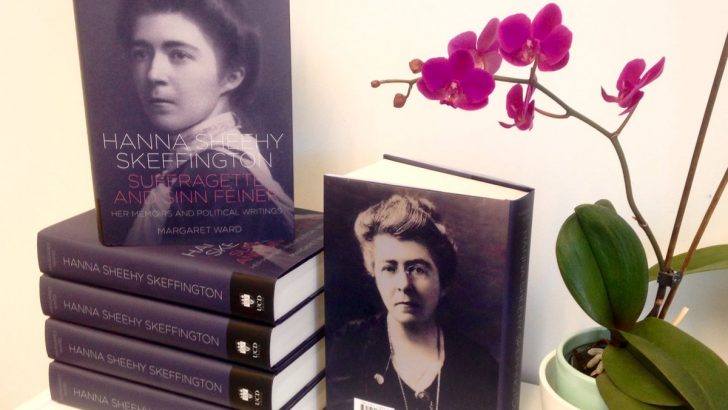Hanna Sheehy Skeffington: Suffragette and Sinn Féiner, Her Memoirs and Political Writings
by Margaret Ward (University College Dublin Press, €35)
Sonja Tiernan
The memoirs and political writings of Hanna Sheehy Skeffington is an extensive and valuable collection that makes for a thoroughly engaging read. Publication of this book provides a tremendous primary resource to support the still neglected, but growing, area of Irish women’s history and gender history more broadly.
It is evident that the collection has taken considerable time and research skills to collect and compile. The content of this material is remarkable, comprising of writings by a radical political activist on such a broad range of issues including nationalism, pacifism, the formation of the Irish Free State, the murder of her husband Francis Sheehy-Skeffington, her prison experiences and her political activities in Europe and America.
Ward describes Hanna Sheehy-Skeffington as ‘the most significant feminist in twentieth-century Ireland.’ This is a rather grand claim but it is a justifiable one.
Feminist
Hanna was also the most resilient feminist campaigner havingformed the first militant suffrage organisation in Ireland, the Irish Women’s Franchise League, in 1908. She continued to be an outspoken feminist voice during harsh times for gender equality in Ireland in the decades ahead. While the provisional government of Ireland promised equality for women in a country free from British rule, the reality of positioning women as inferior in the 1937 Constitution drafted under Éamon de Valera still resonates with Irish feminists today.
Hanna, a former member of the Fianna Fáil party, was quick to take de Valera and his party to account, noting in her article on the Irish Constitution published in Prison Bars, that ‘there is no woman in Mr de Valera’s Cabinet and but two in his party.
While the Decade of Centenaries in Ireland has ensured that even more primary source material is readily available relating to the nationalist movement in Ireland through such resources as the Military Archives, there are fewer resources available about topics covered in this volume.
Women’s writings about, the often complex, area of suffrage in Ireland, women’s access to education and feminist reflections during the interwar years are not readily available. This collection is original in that it focuses on the political writings of a woman who was involved in numerous significant campaigns in Ireland and negotiated with key characters in Britain, America and across Europe during turbulent political times.
The material is well structured and the division into seventeen sections is effective and follows a clear chronology that also maps the development of Sheehy Skeffington’s political concerns.
The introductions by Ward to each section are concise, clear and effective. The chronology at the beginning of the volume is extremely effective in situating not only key points in Sheehy Skeffington’s life but offers a wider context by including dates in which women’s organisations were founded or when related legislation was introduced.
Including a foreword written by Hanna’s granddaughter, Micheline Sheehy Skeffington, is wonderful on many aspects. Micheline is a highly respected feminist campaigner in her own right having won a landmark case against NUI Galway for gender discrimination in the promotion of academic staff. It seems most appropriate to include her writing in such a volume.
Essential Guide
Margaret Ward is a pioneer of women’s history having written publications that paved the way for others to expand on what was an ignored aspect of Irish history. This publication builds on Ward’s previous works, most obviously on her landmark biography, Hanna Sheehy Skeffington: A life (1997.)
The biography has become an essential research guide on this radical feminist campaigner and this new publication complements and extends on this. Having read this book in production, it is a pleasure to read the beautifully produced final publication.



